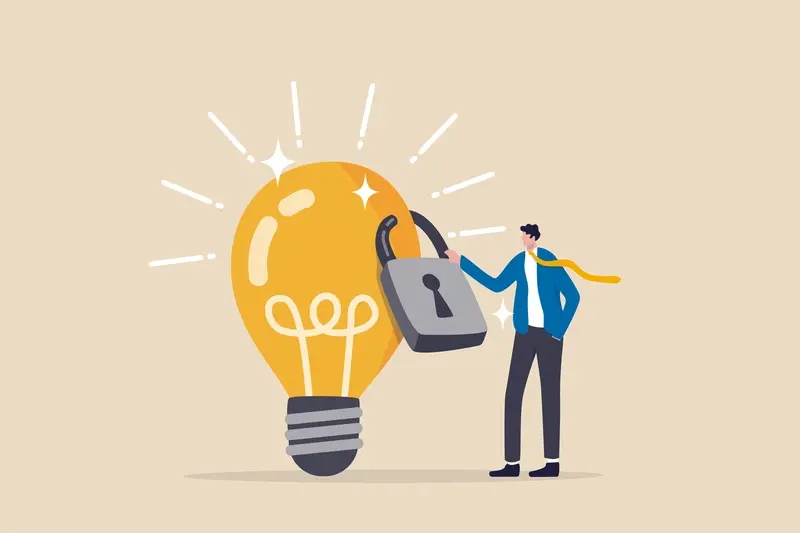What Happens to Your IP When Developers Leave Your Project?
A language learning startup spent six months working with a freelance developer on their mobile app. The founder thought everything was going smoothly until the developer suddenly stopped responding to messages. When they finally made contact, the developer demanded additional payment and threatened to withhold the source code. The startup discovered they had no legal claim to the code they'd paid to create—and their entire project was essentially held hostage.
This scenario happens more often than you'd think in the mobile app world. Developer turnover is a reality every business faces, whether you're working with freelancers, agencies, or even in-house teams. People leave projects for all sorts of reasons: better opportunities, personal circumstances, or sometimes just because they've lost interest in your vision.
But here's what many business owners don't realise until it's too late—when developers walk away, they might take your intellectual property with them. We're talking about your source code, design assets, database structures, and sometimes even access to the platforms where your app is published. Without proper planning, you could find yourself starting from scratch or paying ransom fees to get your own project back.
The biggest mistake I see businesses make is assuming that paying for development work automatically means they own everything that gets created.
The good news? You can protect yourself from these situations with the right knowledge and preparation. Understanding IP ownership, having proper contracts in place, and knowing what to do during handovers can save you thousands of pounds and months of delays. This guide will walk you through everything you need to know to keep control of your app project, no matter who's building it for you.
Protecting Your Ideas During Initial Conversations
Right, let's talk about those first conversations with potential developers. This is where most people make their biggest mistakes—they either clam up completely or spill everything like they're chatting to their best mate down the pub. Neither approach works particularly well, and I've seen both strategies backfire spectacularly over the years.
The thing is, you need to share enough information for developers to understand your project and give you a proper quote. But you also don't want to hand over your entire business plan in that first meeting. It's a balancing act, and honestly, it takes a bit of practice to get right.
What to Share (and What to Keep Close)
Here's what I typically recommend sharing in those initial conversations:
- The general problem your app solves
- Your target audience and market size
- Basic functionality requirements
- Rough timeline and budget expectations
- Technical requirements (iOS, Android, or both)
What you should keep to yourself? The secret sauce. Your unique algorithms, specific monetisation strategies, detailed user acquisition plans, or any proprietary processes that give you a competitive edge. Save those for after you've signed proper agreements.
Before you even start these conversations, get a simple Non-Disclosure Agreement (NDA) template from a solicitor. Most professional developers won't baulk at signing one—if they do, that's your first red flag. Sure, some agencies might have their own NDA they prefer to use, and that's usually fine too. Just make sure it actually protects your interests, not just theirs.
The key is finding that sweet spot where you share enough to get meaningful feedback and accurate quotes, but not so much that you've given away your competitive advantage before any contracts are signed.
Understanding Who Owns What
Right, let's tackle one of the biggest misconceptions in app development—who actually owns your intellectual property. I've seen too many business owners assume that because they paid for development, they automatically own everything. That's not always the case, and it can lead to some pretty nasty surprises down the road.
Here's the thing most people don't realise: developers often retain rights to certain parts of their work unless explicitly stated otherwise in your contract. This might include code libraries they've built over time, frameworks they've developed, or even design patterns they commonly use. It's not necessarily malicious—it's just how the industry works in many cases.
What You Should Own vs What Developers Might Keep
Your app's unique features, branding, content, and overall concept? That should definitely be yours. But the underlying code architecture, third-party integrations, and development tools? These areas get a bit murky without proper documentation.
I always tell my clients to think about it like building a house. You own the house and its design, but the builder might use their own tools and techniques that they've perfected over years. The difference with software is that these "tools" often become part of your final product.
Always ask for a detailed breakdown of what will be considered your IP versus what the developer considers their own intellectual property before any work begins.
The Database and User Data Question
Here's where things get really interesting—your user data and database structure. This should absolutely be yours, no questions asked. But I've seen contracts where developers retain hosting rights or database access indefinitely. That's a red flag that needs addressing immediately.
Make sure your contract clearly states that all user data, analytics, and business intelligence generated by your app belongs to you and can be exported at any time.
Contracts That Actually Protect You
Right, let's talk about the stuff that actually matters when it comes to contracts. I've seen too many clients get burned because they signed agreements that looked professional but were basically useless when things went wrong. And trust me, things do go wrong.
The first thing you need to understand is that standard contracts from agencies often favour... well, the agency. Shocking, I know! But seriously, many of these agreements have clauses that give developers broad rights to your intellectual property or allow them to reuse parts of your code for other projects. That's not necessarily evil—but you need to know what you're signing.
Non-Negotiable Contract Elements
Here's what should be in every single contract you sign for app development work:
- Clear intellectual property ownership stating YOU own all custom code, designs, and concepts
- Work-for-hire clauses that transfer ownership immediately upon payment
- Specific deliverables including source code, design files, and documentation
- Non-disclosure agreements that protect your business ideas and user data
- Termination clauses that guarantee you get everything you've paid for
- Indemnification protecting you from third-party IP claims
I always tell my clients to pay attention to the "derivative works" section. Some contracts let developers keep rights to anything they create based on your original idea. That's a massive red flag. You want language that says "all work product and derivative works become the exclusive property of the client."
One more thing—and this is where I see people get caught out—make sure the contract specifies what happens to any third-party tools or libraries used in your app. You don't want to discover later that your app depends on expensive licenses that the developer controls. Get this sorted upfront, because changing it later is like trying to renovate a house while you're living in it... messy and expensive.
What Happens When Developers Walk Away
Right, let's talk about the elephant in the room—developer turnover. And trust me, it happens more often than you'd think. I've seen brilliant developers disappear overnight, taking all their knowledge about your project with them. Sometimes its personal reasons, sometimes they get a better offer, sometimes they just burn out. Whatever the reason, if you're not prepared for this scenario, you could find yourself in a proper mess.
The first thing that usually happens is panic. Your app is half-built, you've got deadlines looming, and suddenly the person who knows how everything works is gone. But here's the thing—if you've done your homework with proper contracts and documentation requirements, this doesn't have to be a disaster. The key is making sure that from day one, developers are required to document their work properly and store everything in repositories you control.
Whether you're working with remote development teams or local agencies, having clear documentation and proper handover processes protects you from unexpected departures.
Code Access and Documentation
I always insist that clients have direct access to their code repositories; this isn't negotiable. When a developer leaves, you need to be able to hand over their work to someone new without missing a beat. That means having detailed documentation, clear code comments, and a proper handover process built into your contracts from the start.
Using established bug tracking systems and development tools makes it much easier for new team members to understand where the project stands and continue the work seamlessly.
The worst time to discover you don't own your code is when you need to find a new developer to finish your project
Look, developer turnover is just part of the business these days. People move around, projects change, life happens. But with the right preparation—proper contracts, good documentation practices, and clear IP ownership—it becomes just another business challenge rather than a project-ending catastrophe. Plan for it, because eventually you'll need those plans.
Safe Ways to Discuss Your App Idea
Right, let's talk about how to actually share your app idea without losing sleep over it. I mean, you can't build an app in complete secrecy—you need to talk to developers, designers, and probably a few other people along the way. But there's a smart way to do this that protects you whilst still getting the help you need.
Start with the basics but keep the secret sauce to yourself. When you're in those initial conversations, share enough to demonstrate there's a real opportunity but don't reveal every detail of your unique approach. Think of it like showing someone the map but not marking where the treasure is buried—they get the general direction without knowing exactly where you're going.
The Three-Layer Approach to Sharing
- Layer one: The problem you're solving and why it matters
- Layer two: Your general approach and target market
- Layer three: The specific features and secret differentiators (only after contracts are signed)
You know what? Most experienced developers have heard hundreds of app ideas. They're not sitting there plotting to steal yours—they're genuinely trying to understand if they can help you build it properly. But that doesn't mean you should be careless about it.
Here's something that works well: create a simple one-page overview that explains the core concept without diving into the proprietary bits. Include the market problem, your target audience, and maybe one or two key features. Save the really clever stuff—your unique algorithms, specific monetisation strategies, or innovative user experience flows—for after you've got proper agreements in place.
And honestly? If a developer can steal your idea based on that high-level overview alone, then maybe your idea wasn't as unique as you thought it was.
The Handover Process That Works
Right, so you've done the hard bit—you've got proper contracts in place, you understand who owns what, and your IP is protected. But what happens when it's actually time for a developer to hand over their work? I've seen this go spectacularly wrong more times than I care to count, usually because nobody planned for it properly.
The thing is, a good handover doesn't start when someone's walking out the door. It starts from day one of your project. Every piece of code should be documented, every decision should be recorded, and everything should be stored in a way that makes sense to someone who wasn't there when it was built.
Understanding realistic mobile app development timelines helps you plan for proper handover procedures without rushing the process.
What You Need Before Anyone Leaves
When a developer is leaving—whether it's planned or not—you need to get your hands on everything they've created for your project. And I mean everything. Not just the final app files, but all the working files, prototypes, design assets, and any third-party accounts they've set up on your behalf.
- All source code and project files
- Design files and assets (images, fonts, icons)
- Documentation and technical notes
- Login details for any developer accounts
- App Store and Google Play access
- Any analytics or tracking accounts
- Server access and hosting details
Here's something that catches people out—make sure you get the "raw" files, not just exports. You need the original Photoshop files, not just PNG images. You need the actual code repository, not just a zip file of the final build. Trust me on this one; you'll thank me later when you need to make changes.
Always insist on a proper handover meeting where the departing developer walks through their work with whoever's taking over. A 30-minute call can save you weeks of confusion later.
The key is treating this like a business process, not a personal favour. Be professional about it, follow your contract requirements, and don't let anyone make you feel bad for asking for what's rightfully yours.
Red Flags to Watch For
After years of working in this industry, I've learned to spot the warning signs that suggest a development team might not have your IP interests at heart. Some of these red flags are obvious, but others? Well, they're a bit more subtle.
The biggest red flag is when developers are reluctant to sign proper agreements. If someone pushes back on NDAs or tries to rush you past the contract stage, that's your cue to walk away. I mean, if they won't protect your IP before they start working, what makes you think they'll respect it later?
Communication Red Flags
Watch out for teams that are vague about ownership from the start. They'll use phrases like "we'll sort that out later" or "don't worry about the legal stuff yet." Actually, you should worry about it—right from day one. Another warning sign is when developers insist on using their own tools, frameworks, or systems without explaining why or how you'll maintain access to everything.
Here are the most common red flags I've encountered:
- Refusing to discuss IP ownership upfront
- Pushing for equity instead of clear payment terms
- Being evasive about code repository access
- Not providing regular backups or progress reports
- Insisting on keeping development "in-house" without transparency
- Avoiding discussions about project handover procedures
There are many warning signs to watch for when interviewing developers, and being evasive about intellectual property protection should be at the top of your list.
Trust your instincts here. If something feels off about how a team approaches IP protection, it probably is. Good developers understand that your intellectual property is valuable and will work with you to protect it properly. The ones who don't? Well, they're not worth the risk, no matter how talented they might seem.
Conclusion
Right, let's wrap this up with what really matters. After eight years of watching projects succeed and fail based on how well they handle IP protection, I can tell you this—the developers who leave with proper handovers aren't the ones you need to worry about. It's the ones who leave without any documentation, clear contracts, or transfer processes that'll give you sleepless nights.
The thing is, protecting your intellectual property isn't just about legal documents (though those matter massively). It's about creating systems from day one that assume people will leave—because they will. Developers change jobs, start their own companies, or move abroad. That's just the reality of our industry.
I've seen too many brilliant app ideas get stuck in legal limbo because someone thought a handshake agreement was enough. Don't be that person. Get proper contracts, document everything, and make sure you understand exactly what you own before any code gets written.
But here's what I want you to remember most—good developers actually want these processes in place too. They protect everyone involved. The developers who push back against proper IP documentation? Those are your red flags right there.
The mobile app world moves fast, and developer turnover is just part of the landscape. But with the right preparation, it doesn't have to derail your project or put your IP at risk. Set up these protections early, stick to them consistently, and you'll sleep much better knowing your app idea is truly yours—no matter who comes and goes from your development team.
Share this
Subscribe To Our Learning Centre
You May Also Like
These Related Guides

Which Documents Keep Your App IP Safe During Development?

How Do You Protect Your App Idea When Working With Remote Developers?



